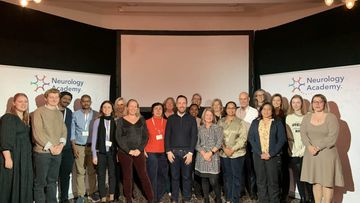Raising the bar for MS: Social determinants of health
Professor Gavin Giovannoni talks to us about the social determinants of health, and why this MS workstream will help tackle variance and raise the bar for people with MS.Gavin is the lead for this workstream – find out more about the workstream itself here or learn more about the background to this work. Fig: Social determinants of health: the Kings Fund[/caption]
Fig: Social determinants of health: the Kings Fund[/caption]
Why is addressing the social determinants of health (SDoH) so important?
‘The SDoH are critical if want to ‘Raise the Bar’ for everyone. It may prove relatively easy to improve services for well-educated engaged people, but it is important not to ignore the needs of the more vulnerable pwMS, i.e. the less educated, less eloquent, less well off and less demanding patients. We want to provide MS services for all.’[caption id="" align="alignnone" width="850"] Fig: Social determinants of health: the Kings Fund[/caption]
Fig: Social determinants of health: the Kings Fund[/caption]What can people expect if they get involved in this workstream?
‘Participating centres will be working differently and managing MS holistically.This will include programmes to screen and manage comorbidities and to promote lifestyle interventions. Participating centres will collect data on these new activities as part of the annual national audit.As part of this holistic management of MS, there will be a ‘no patient left behind’ philosophy embedded in all MS services.This will require systems to make sure that all people with MS, who are covered by a particular service, will have access to that service.We don’t want vulnerable, less educated or less well off patients to be disadvantaged by the service.’
What does this workstream hope to achieve?
‘As part of this holistic management of MS, we want to imprint on all participating MS centres a ‘no patient left behind’ philosophy. This will require systems to make sure that all people with MS, who are covered by a particular service, will have access to that service.We don’t want the vulnerable, less educated, ethnic minorities or less well off patients to be disadvantaged by the service. Ideally, we would like to see annual metrics showing that each centre is proactively addressing SDoH in their patient population.We want to address the cognitive biases that allow the SDoH to affect outcomes.’Is this workstream right for you?
‘The SDoH workstream is targeting all healthcare professionals and people living with MS who are interested in the bigger picture. By that, I mean trying to address the other often-ignored factors in society that drive inequality in health outcomes.’Background reading for this workstream:
As well as reading the ‘focus on the workstream’ and listening to ‘the Way Forward’ event’s presentations on this subject, ‘The Health Gap: The Challenge of an Unequal World’ by Michael Marmot and ‘The Spirit Level’ by Kate Pickett and Richard G. Wilkinson are both recommended. You can also watch a couple of highly valuable YouTube videos from Sir Michael Marmot on the subject: Social Determinants of Health (2014 WORLD.MINDS) and Developing further action on reducing the social gradient in health.Related articles
Encouraging excellence, developing leaders, inspiring change
MS Academy was established five years ago and in that time has accomplished a huge amount. The six different levels of specialist MS training are dedicated to case-based learning and practical application of cutting edge research. Home to national programme Raising the Bar and the fantastic workstream content it is producing, this is an exciting Academy to belong to.


